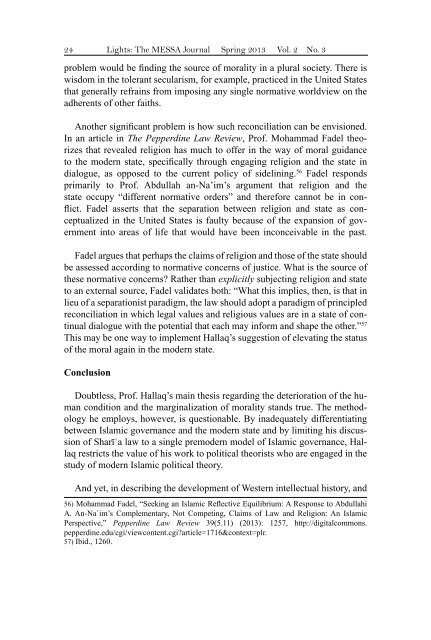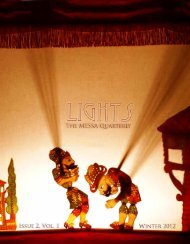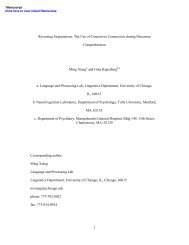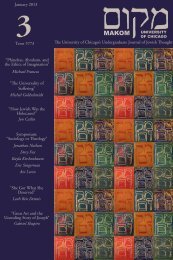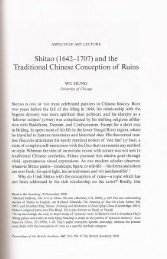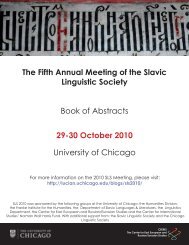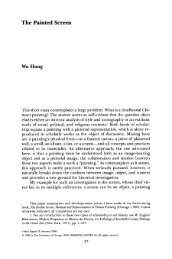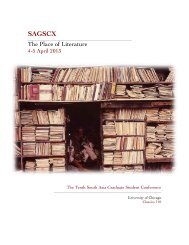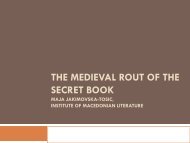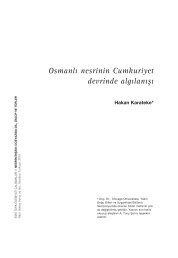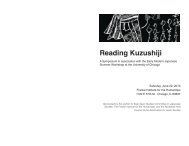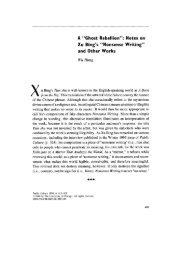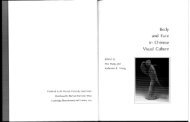Create successful ePaper yourself
Turn your PDF publications into a flip-book with our unique Google optimized e-Paper software.
24 Lights: The MESSA Journal Spring 2013 Vol. 2 No. 3<br />
problem would be finding the source <strong>of</strong> morality in a plural society. There is<br />
wisdom in the tolerant secularism, for example, practiced in the United States<br />
that generally refrains from imposing any single normative worldview on the<br />
adherents <strong>of</strong> other faiths.<br />
Another significant problem is how such reconciliation can be envisioned.<br />
In an article in The Pepperdine Law Review, Pr<strong>of</strong>. Mohammad Fadel theorizes<br />
that revealed religion has much to <strong>of</strong>fer in the way <strong>of</strong> moral guidance<br />
to the modern state, specifically through engaging religion and the state in<br />
dialogue, as opposed to the current policy <strong>of</strong> sidelining. 56 Fadel responds<br />
primarily to Pr<strong>of</strong>. Abdullah an-Na’im’s argument that religion and the<br />
state occupy “different normative orders” and therefore cannot be in conflict.<br />
Fadel asserts that the separation between religion and state as conceptualized<br />
in the United States is faulty because <strong>of</strong> the expansion <strong>of</strong> government<br />
into areas <strong>of</strong> life that would have been inconceivable in the past.<br />
Fadel argues that perhaps the claims <strong>of</strong> religion and those <strong>of</strong> the state should<br />
be assessed according to normative concerns <strong>of</strong> justice. What is the source <strong>of</strong><br />
these normative concerns? Rather than explicitly subjecting religion and state<br />
to an external source, Fadel validates both: “What this implies, then, is that in<br />
lieu <strong>of</strong> a separationist paradigm, the law should adopt a paradigm <strong>of</strong> principled<br />
reconciliation in which legal values and religious values are in a state <strong>of</strong> continual<br />
dialogue with the potential that each may inform and shape the other.” 57<br />
This may be one way to implement Hallaq’s suggestion <strong>of</strong> elevating the status<br />
<strong>of</strong> the moral again in the modern state.<br />
Conclusion<br />
Doubtless, Pr<strong>of</strong>. Hallaq’s main thesis regarding the deterioration <strong>of</strong> the human<br />
condition and the marginalization <strong>of</strong> morality stands true. The methodology<br />
he employs, however, is questionable. By inadequately differentiating<br />
between Islamic governance and the modern state and by limiting his discussion<br />
<strong>of</strong> Sharīʿa law to a single premodern model <strong>of</strong> Islamic governance, Hallaq<br />
restricts the value <strong>of</strong> his work to political theorists who are engaged in the<br />
study <strong>of</strong> modern Islamic political theory.<br />
And yet, in describing the development <strong>of</strong> Western intellectual history, and<br />
56) Mohammad Fadel, “Seeking an Islamic Reflective Equilibrium: A Response to Abdullahi<br />
A. An-Na`im’s Complementary, Not Competing, Claims <strong>of</strong> Law and Religion: An Islamic<br />
Perspective,” Pepperdine Law Review 39(5.11) (2013): 1257, http://digitalcommons.<br />
pepperdine.edu/cgi/viewcontent.cgi?article=1716&context=plr.<br />
57) Ibid., 1260.


